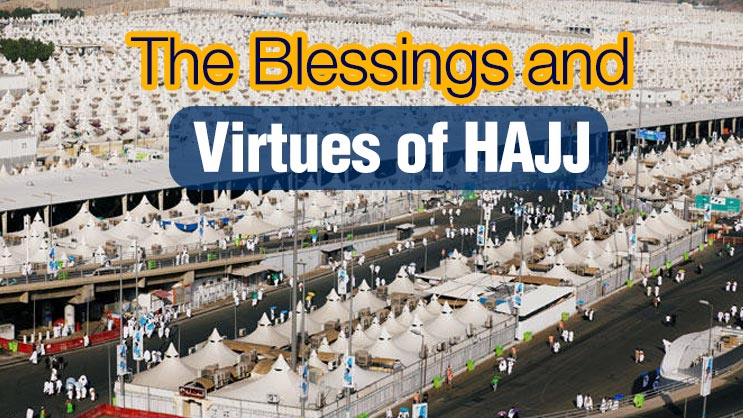
Radiant Teachings of Islam
Sermon of the Prophet’s Farewell Hajj
Rashid Ali
Allah tasked our master, Prophet Muhammad صَلَّى الـلّٰـهُ عَلَيْهِ وَاٰلِهٖ وَسَلَّم to guide and teach mankind. In honouring this role and fulfilling his divine mission, the Prophet صَلَّى الـلّٰـهُ عَلَيْهِ وَاٰلِهٖ وَسَلَّم employed different strategies, ensuring that his message reached hearts and souls and not only ears. For example, he conveyed divine revelation, led by example, taught people how to live ethically, encouraged good works, answered questions in accordance with the condition of the asker, explained Islam and its parameters, delivered public addresses on occasions like Jumuʿah and Eid, eloquently and judiciously addressing the needs of his people.
In summary, the Prophet صَلَّى الـلّٰـهُ عَلَيْهِ وَاٰلِهٖ وَسَلَّم provided guidance relating to each facet of human life. His speeches and public addresses were pertinent in this regard. These were conducted on occasions of battle, when greeting delegations, Jumuʿah, Eid and Hajj etc. All of them hold their own bespoke importance, but the sermon delivered during his farewell Hajj holds a distinct position amongst them all.
The sermon of the farewell Hajj is an indispensably important historical document and Islamic constitution. It is a charter that champions human rights, a mandate for universal peace, and a strategic approach to human success. Via a multitude of narrators, this is can be found in books of hadith, Prophetic biography and history. Some authors have even compiled entire works by collecting narrations pertaining to it.
The sermon bears its name from the fact it was given during the last Hajj of the Prophet صَلَّى الـلّٰـهُ عَلَيْهِ وَاٰلِهٖ وَسَلَّم. This was also the only Hajj he performed after migrating to Madinah from Makkah, which he foretold would be his last on many occasions. When the Companion Muʿādh b. Jabal رَضِىَ الـلّٰـهُ عَـنْهُ was made a governor and sent to Yemen, the Prophet صَلَّى الـلّٰـهُ عَلَيْهِ وَاٰلِهٖ وَسَلَّم said:
يَا مُعَاذُ إِنَّكَ عَسَى أَنْ لَا تَلْقَانِي بَعْدَ عَامِي هَذَا وَلَعَلَّكَ أنَ تَمُرَّ بِمَسْجِدِي هَذَا وَقَبْرِي
“Dear Muʿādh, you will most probably not meet me after this year, and perhaps you will pass this masjid of mine and my grave.”
The sadness of being distanced from the Prophet صَلَّى الـلّٰـهُ عَلَيْهِ وَاٰلِهٖ وَسَلَّم moved Muʿādh to tears.[1] Due to the fact that the Prophet صَلَّى الـلّٰـهُ عَلَيْهِ وَاٰلِهٖ وَسَلَّم passed away after this Hajj and bade farewell to his ummah, the public address he issued on this occasion became known as his farewell Hajj sermon.
During his farewell Hajj, the Prophet صَلَّى الـلّٰـهُ عَلَيْهِ وَاٰلِهٖ وَسَلَّم delivered four sermons. According to Imam al-Nawawī, “The first was delivered near the Kaʿbah on the seventh day of Dhū al-Ḥijjah; the second in Masjid Nimrah on the Day of ʿArafah; the third in Mina on Eid al-Aḍḥā; and the fourth in Mina on the second day of tashrīq.”[2]
Let us now look at some aspects of this historic sermon:
Fulfilling the Rights of Allah
Abū Umāmah رَضِىَ الـلّٰـهُ عَـنْهُ relates that in this sermon, the Prophet صَلَّى الـلّٰـهُ عَلَيْهِ وَاٰلِهٖ وَسَلَّم said, “Fear your Lord, perform the five salah, keep the fasts of Ramadan, pay zakat on your wealth, and obey those in authority over you. You will then enter the Paradise of your Lord.”[3]
Human Equality
After thanking and praising Allah, the Prophet صَلَّى الـلّٰـهُ عَلَيْهِ وَاٰلِهٖ وَسَلَّم announced:
Allah indeed states: “O people! We have created you from one man and one woman. We have fashioned you into various nations and tribes, so you may recognise one another. Certainly, in the sight of Allah, the most honourable of you is he who possesses the most piety.”[4]
An Arab has no superiority over a non-Arab, and a non-Arab has no superiority over an Arab. Nor does someone black have superiority over someone white, nor does someone white have superiority over someone black except on the basis of piety. [5]
Sanctity of property and life
During his Eid al-Aḍḥā public address, the Prophet صَلَّى الـلّٰـهُ عَلَيْهِ وَاٰلِهٖ وَسَلَّم declared:
Indeed, your blood, your properties, (one narrator considers the Prophet صَلَّى الـلّٰـهُ عَلَيْهِ وَاٰلِهٖ وَسَلَّم also said) and your honour are sacred to one another like the sanctity of this day of yours, in this city of yours and in this month of yours. Surely you will soon meet your Lord, and He will ask you about your deeds.[6]
Rights of a husband and wife
ʿAmr bin Aḥwāṣ relates that the Prophet صَلَّى الـلّٰـهُ عَلَيْهِ وَاٰلِهٖ وَسَلَّم explained:
Be informed; you have specific rights over your women and they have specific rights over you. Your rights over your women ˹include˺ them not being unchaste, and to not allow whomever you dislike to enter the home. Be informed; your women have the right to be fed and clothed well.[7]
Remaining steadfast upon guidance
Jābir b. ʿAbd Allah relates that, while sitting on his camel, Qaṣwā, the Prophet صَلَّى الـلّٰـهُ عَلَيْهِ وَاٰلِهٖ وَسَلَّم delivered a sermon on the Day of ʿArafah. “O people,” he announced, “I am leaving amongst you that which if you hold to, you will never fall into misguidance: the book of Allah and my Family (Ahl al-Bayt).”[8]
Conveying the Message of the Prophet
The Prophet صَلَّى الـلّٰـهُ عَلَيْهِ وَاٰلِهٖ وَسَلَّم delivered a sermon on Yawm al-Naḥr. Towards the end he said, “Whoever is present should convey (my message) to those who are not, as many times, he who receives remembers better than he who conveyed.”[9]
Order of Perseverance
After disseminating advice in his Yawm al-Naḥr sermon, the Prophet صَلَّى الـلّٰـهُ عَلَيْهِ وَاٰلِهٖ وَسَلَّم ordained, “Do not resort to the actions of disbelievers after I pass, lest you begin killing one another.”[10]
Testimony on Preaching the Divine Message
In another narration relayed by the Companion Jābir b. ʿAbdullah, the Prophet صَلَّى الـلّٰـهُ عَلَيْهِ وَاٰلِهٖ وَسَلَّم asked after delivering a sermon, “O people! When you are asked about me, what will you say?” The people said, “We will testify you certainly conveyed the message, fulfilled the right and advised us.” The Prophet صَلَّى الـلّٰـهُ عَلَيْهِ وَاٰلِهٖ وَسَلَّم then raised his index finger to the sky and exclaimed, “Dear Allah, be witness!” He said this three times.[11]
[1] Musnad Imām Aḥmad: 22,052
[2] Sharḥ Ṣaḥīḥ Muslim li al-Nawawi, vol. 9, p. 57
[3] Jāmiʿ al-Tirmidhi: 616
[4] Al-Quran, 49:13
[5] Muʿjam al-Kabīr: 16
[6] Ṣaḥīḥ al-Bukhāri: 4,406
[7] Jāmiʿ al-Tirmidhi: 1,166
[8] Jāmiʿ al-Tirmidhi: 3,811
[9] Ṣaḥīḥ al-Bukhāri: 1,741
[10] Ṣaḥīḥ al-Bukhāri: 1,739
[11] Ṣaḥīḥ Muslim: 2,950


















Comments